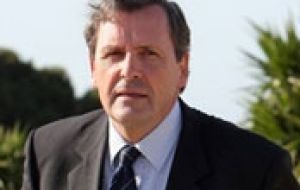MercoPress. South Atlantic News Agency
UN outgoing chief of missions says “force does matter”
 Alain Le Roy, new head the organizations' peacekeeping operations
Alain Le Roy, new head the organizations' peacekeeping operations The days of United Nations missions fielding only unarmed observers are long past, according to the outgoing head of the world body's peacekeeping operations, who said on Tuesday that peacekeepers need to be able to wield force to get respect and make a difference.
Jean-Marie Guéhenno, who will be replaced by fellow Frenchman Alain Le Roy when he steps down after almost eight years as Under-Secretary-General of Peacekeeping Operations, told reporters in New York that hard lessons had been learned in recent times. "I, for one, am convinced that force does matter – that we are a long way past the time when peacekeeping started 60 years ago and we would have only unarmed observers: force does matter. To be able to be respected is essential," he said, especially in civil conflicts. "I have pushed for robust peacekeeping in the forests of Congo as well as a deterrent instrument in Sierra Leone, or in the slums of Port-au-Prince [the Haitian capital]," he stressed. During Mr. Guéhenno's eight-year term, peacekeeping has seen an unprecedented expansion. Today the UN deploys 20 peacekeeping operations around the globe, with some 110,000 personnel in the field – not including the joint Darfur mission with the African Union (UNAMID), which is slated to have 26,000 peacekeepers at full deployment. However, Mr. Guéhenno cautioned that force was a very blunt instrument. "The notion that you can enforce a peace is wrong. It's over-ambitious," he stressed. "What you can do is deter spoilers on the margin of a conflict, but peace it has to be made by those who made war. You can help them – you can provide a measure of trust in that transition where they're tired of war but not yet convinced of the good intentions of the other side, and that's where a robust peacekeeping force can make a real difference – but you're not going to impose peace with a UN force." The Under-Secretary-General said that peacekeeping was essentially a political process and needed the full support of Member States as well as a united Security Council. He called on contributing countries not to skimp on financial support for missions. "To the financial contributors, to those countries that pay the overwhelming percentage of our budget, I say don't cut on the missions – you'll make them more fragile and you can lose the whole investment," he said. Quoting recent research Mr. Guéhenno told reporters that the general trend worldwide was for a decrease in conflicts since the Cold War, a process that has been accompanied by an increase in peacekeeping operations, but he said that missions should not be launched without proper planning. "I have seen in a number of places from Liberia to Haiti to Sierra Leone that a difference was made – insufficient, imperfect – but a difference was made and I think it's important for the United Nations to be able to continue to make that difference… because for many people it's their only hope and the UN is the institution of last resort," he concluded.




Top Comments
Disclaimer & comment rulesCommenting for this story is now closed.
If you have a Facebook account, become a fan and comment on our Facebook Page!